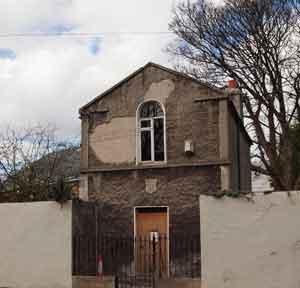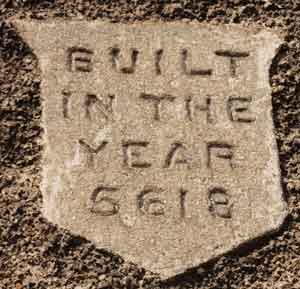By Fiona Fitzsimons

In the 1500s some ‘Murrano’ Jewish families, expelled from Spain by the Catholic monarchs Ferdinand and Isabella, chose to settle in port towns along the Irish coast. The Murranos that settled in Ireland were merchant mariners, with capital and international contacts. In the early modern period they seem to have accepted diplomatic and spying missions in Europe on behalf of the English Crown. The most famous of these families were the Annyas in Youghal, Co. Cork, at least two of whom were elected mayors of Youghal in the late sixteenth century.
Shortly after the Restoration in 1660, a permanent Jewish community was founded in Dublin. The first synagogue was in Crane Lane. In 1728 the community bought a plot of land in the northside suburb of Fairview and founded a dedicated Jewish cemetery in Ballybough. Very little is known about this community in its first 100 years, partly because locals stole the tombstone slabs for building. By the mid-eighteenth century there were approximately 40 Jewish families in Dublin, comprising c. 200 persons. A small community was established in Cork city. In the next century the Jewish community in Ireland remained fairly static.
In the 1880s religious unrest in the Russian Empire led to pogroms that forced the expulsion of tens of thousands of Lithuanian Jews. They arrived in Britain and Ireland as religious and economic refugees. By the early twentieth century the Jewish population in Ireland was probably at its height of c. 4,800. It was a diverse community, but one common thread was that they lived almost exclusively in the cities—Dublin, Belfast, Cork and Limerick. In the twentieth century their numbers were reduced by emigration, initially to America and later, after 1948, to the newly declared state of Israel.

None of the early Jewish records survive, although, anecdotally, records of observant Jews resident in Ireland in the seventeenth and eighteenth centuries can be found in the English marriage registers. The earliest surviving registers in England (all from London) are from the Bevis Marks synagogue (1656–1837) for Sephardic Jews, Duke’s Palace (1770–1973) for Ashkenazi, and Hambro (1770–1938) and New Synagogue (1774–1992). Most records of the English synagogues over the past century are available on the International Genealogical Index. Until c. 1728, when the Jewish cemetery opened in Ballybough, all burials are to be found in registers of the Established Church (e.g. 25 August 1688, Deborah, daughter of John Mayers fruiterer & Leah his wife, in St Michan’s CoI).
A research project initiated by Marsh’s Library in 2017 will hopefully elucidate the history of Jewish settlement in Ireland before 1700. The Library has established a fellowship to research its early Jewish books. This small collection of almost 200 books was accessioned directly from the Library’s founder, Archbishop Narcissus Marsh (1635–1713).
If tracing Jewish ancestors in Ireland after 1800, historian Stuart Rosenblatt has single-handedly compiled records of over 56,000 Irish Jews, using their ‘Irish’ and Hebrew names, from religious and state records in Ireland. The records date from c. 1820 to the present day and provide biographical information including date and place of birth, school(s) attended, marriage and occupation, date and place of death and burial, and family connections to parents, children and siblings. In the twentieth century the records also draw on the Alien Registration records 1914–22. A unique feature of these records is that they include family histories as told to the author. A redacted copy of these records is available online at http://www.irishjewishroots.com/names/. The full work, comprising sixteen volumes, is available in the National Archives of Ireland and the Gilbert Library in Pearse Street. Rosenblatt’s prosopography can be supplemented by records of civil and local government (births, marriages and deaths; Petty Sessions Courts; the 1901 and 1911 censuses of Ireland; occupational records; newspapers; school registers etc.).
Fiona Fitzsimons is a director of Eneclann, a Trinity campus company, and of findmypast Ireland.
